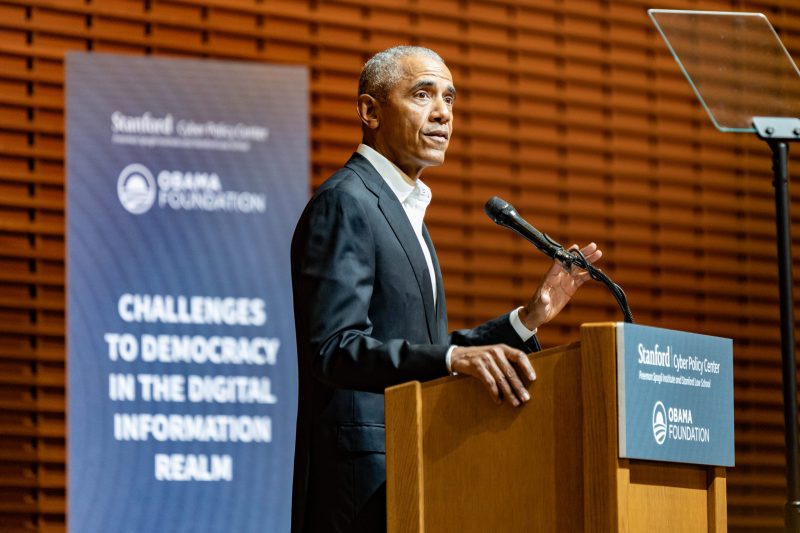Former President Barack Obama called on technology leaders and the political community to take action against disinformation in a Thursday keynote at Stanford. Vulnerabilities in today’s digital information environment, he warned, could further exacerbate democratic backsliding around the world.
In a speech punctuated with humor, tech metaphors and references to Stanford, the former president returned repeatedly to the assertion that the fundamental design of many social media platforms has endangered the health of global democracy. However, there remains room, he said, to preserve the transformative power of technology while mitigating its worst harms.
“What we’ve now learned is the product has some design flaws,” he said. “There are some bugs in the software.”
Thursday marked Obama’s first official visit to the Bay Area since 2019, as well as his first trip to the Stanford campus in half a decade. Obama drew crowds to Stanford in 2015 and 2016 for back-to-back events, leveraging Stanford’s ties to Silicon Valley to speak about technology and innovation.
In the CEMEX Auditorium, Obama reunited with Michael McFaul ’86 M.A. ’86, who served as his ambassador to Russia, and Valerie Jarrett ’78, the CEO of the Obama Foundation. The former president’s address was the keynote of the “Challenges to Democracy in the Digital Information Realm” symposium, which was co-hosted by the Obama Foundation and the Stanford Cyber Policy Center. The day-long event covered polarization, digital authoritarianism and effective democratic discourse. Obama was introduced by Tiana Epps-Johnson ’08, an Obama Foundation fellow and founder and executive director for the Center for Tech and Civic Life.
About 600 people — including students selected by a lottery, University administrators and Silicon Valley executives — packed into the auditorium to hear the address.
Obama’s trip to Stanford is a high-profile stop on his campaign against online disinformation and its impact on democracy, which he has taken to tech giants including Apple and Alphabet, according to The New York Times. He also made his case to the public earlier this month when he gave a keynote address at the “Disinformation and the Erosion of Democracy” conference co-hosted by the University of Chicago and The Atlantic.
He struck a similar tone on Thursday, calling for increased regulation of social media companies that could include changes to Section 230 of the Communications Decency Act. Dismissing a “wholesale repeal” of the legislation, he proposed the introduction of an “average standard of care” when it comes to advertising to account for the dramatic changes in the tech industry.
“Innovation and regulation are not mutually exclusive,” he said. “All companies initially always complain that the rules are going to stifle innovation and destroy the industry. The truth is that a good regulatory environment usually ends up soaring innovation.”
International Policy Director at the Cyber Policy Center Marietje Schaake echoed the former president’s call for change, tweeting that “technology accountability is coming to America.”
Change is in the air. Technology accountability is coming to America ↘️ pic.twitter.com/ihnPEyOBpM
— Marietje Schaake (@MarietjeSchaake) April 22, 2022
Obama’s intensified focus on the digital information environment comes during a “tumultuous” and “dangerous” moment — Russia’s invasion of Ukraine, he said, is one of many global examples of strongmen undermining democracy and the rule of law.
“People like Putin and Steve Bannon for that matter understand it’s not necessary for people to believe disinformation in order to weaken democratic institutions,” Obama said. “You just have to flood a country’s public square with enough raw sewage, you just have to raise enough questions, spread enough dirt, plant enough conspiracy theorizing that citizens no longer know what to believe.”
Though unintended consequences are inevitable risks of social media technology, the former president said that companies’ platform development and regulation decisions have significantly worsened these problems. Without action, the trends will accelerate with the rise of new technology such as artificial intelligence and the creation of “deepfakes,” Obama warned.
“The very design of these platforms is tilting us toward bad results,” he said. “If you want to rise above the crowd, above the din, if you want to be liked, and shared, and yes, go viral, then pedaling controversy, outrage, even hate often gives you an edge.”
Jose Luis Sabau ’22, an honors student at the Center for Democracy, Development and the Rule of Law, wrote that Obama’s speech signified that politicians do care about the Internet’s potential for harm and “are willing to work for a better solution.”
“The Internet, which we all hoped would be a tool for good, has been co-opted by authoritarian leaders to solidify their control over society,” Sabau wrote.
Obama emphasized that social media is not all bad, allowing people to mobilize on issues like climate change and racial justice. For social media’s democratic potential to be realized, changes on both the “supply” and “demand” sides must be made. Tech companies, who he said represent the supply side, need to be more transparent about how they operate with government regulators. A first step would be disclosing the algorithms that they use to promote content.
On the demand side, he urged consumers of media to “[break] through our information bubble,” a commitment that includes becoming better consumers of news, investing in local media and building civic institutions for a new generation.
For Miles McCain ’24, a research assistant at Stanford Internet Observatory, Obama’s address “was a forceful reminder that none of our work is ever neutral — democracy and accountability are values we must put front and center.”
Obama charged his captive audience of tech leaders and future founders with the task of moving corporations in the right direction.
“These companies need to have some other North Star other than just making money and increasing market share,” he said. “You can advocate for change; you can be part of this redesign. And if not, you can vote with your feet and go work with companies that are trying to do the right thing.”
